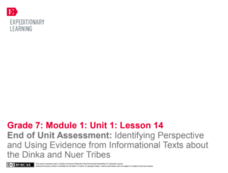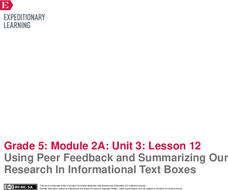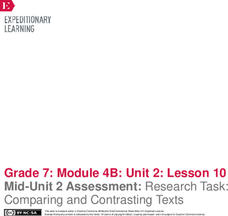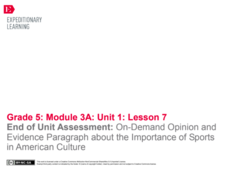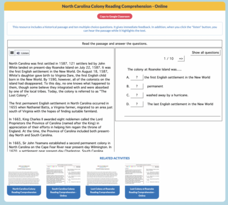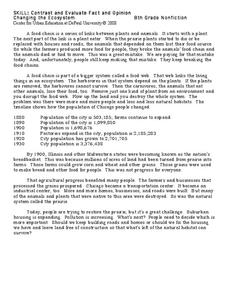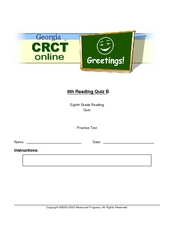EngageNY
Mid-Unit Assessment: Analyzing an Informational Text about a Refugee Experience
Refugee & Immigrant Transitions is an organization that helps newcomers adjust to life in the United States through education and community leadership opportunities. As part of a mid-unit assessment, pupils independently read a...
EngageNY
End of Unit Assessment: Identifying Perspective and Using Evidence from Informational Texts about the Dinka and Nuer Tribes
Pupils consider the varying perspectives of people in different cultural groups as they read an informational text about the Dinka tribe of Southern Sudan and complete graphic organizers. They also respond to a constructed-response...
EngageNY
Using Peer Feedback and Summarizing Our Research In Informational Text Boxes
Insert text box here. Learners use index cards to create their own informational text boxes. The text box includes information about an insect in the rainforest. Scholars also complete the draft of their research science journal entries.
DePaul University
Bold Plans, Big Dreams, City Progress
Determining which statements represent fact or the author's opinion in an integral part of reading informational text. Encourage seventh graders to read a passage about Barack Obama and the city of Chicago, as well as a passage focused...
EngageNY
Mid-Unit 2 Assessment: Research Task: Comparing and Contrasting Texts
It's the half-way mark! Pupils demonstrate understanding of unit standards by completing a mid-unit assessment. After reading an informational article about water management strategies, scholars complete a graphic organizer to identify...
EngageNY
End of Unit Assessment: On-Demand Opinion and Evidence Paragraph about the Importance of Sports in American Culture
Game on! Pupils take their end-of-unit assessment, writing an opinion paragraph about the importance of sports in American culture. To support their opinions, they use evidence from the informational articles they've read throughout the...
Mr. Nussbaum
North Carolina Colony
Ten multiple-choice questions make up an interactive practice designed to increase reading comprehension. The topic of the informational reading is the North Carolina Colony.
DePaul University
Contrast and Evaluate Fact and Opinion
How can you tell when an author is expression an opinion or stating a fact? Use two short reading selections to emphasize the difference between a statement that you can prove and one that you can't. The first passage explains food...
EngageNY
Gathering Information about Water Management: Assessing and Reading Internet Sources, Day 3
Water is life! Using the informative resource, scholars first read two informational articles about water management in agriculture. Then, they use a Venn diagram to contrast the different types of evidence authors use to support a...
EngageNY
Mid-Unit 3 Assessments, Part 2: Summarizing, Analyzing and Discussing Research
Why is reading important? As part of the mid-unit assessment, scholars read, summarize, and analyze an article about the importance of reading. Additionally, they continue their discussion about whether their rules to live by should be a...
EngageNY
Mid-Unit Assessment: Analyzing an Author’s Argument and Text Structure
William Shakespeare: a writer, a poet, a fake? For their mid-unit assessments, scholars read an excerpt from the article "The Top Ten Reasons Shakespeare Did Not Write Shakespeare" by Keir Cutler. Next, they analyze the author's argument...
EngageNY
Mid-Unit Assessment: Analyzing Idea Development in Chapter 3 of World without Fish
Half way there. Scholars work on the mid unit assessment for World without Fish. Learners work independently to complete the assessment. They then answer text-dependent questions and use sticky notes for annotating.
EngageNY
Mid-Unit Assessment: On-Demand Note-taking and Text-Dependent Questions
Flex those brain muscles! Scholars take a mid-unit assessment, conducting research to take notes about how a particular invention helped meet society's needs. To complete the test, they work on draft sketches for their graphic...
EngageNY
Mid-Unit Assessment: On-Demand Note-Taking, Analysis, and Reflection: “Should We Drill?”
Pupils take a mid-unit assessment, completing a point of view graphic organizer based on an informational article about offshore drilling. Next, learners answer text-dependent and short-answer questions about the text.
Odell Education
Reading Closely for Textual Details: "We, as a people, will get to the promised land!"
Take another look—there are probably more details than readers realize. Scholars analyze nine texts in a five-part unit that contains 21 activities to find textual details. Activities include close reading, independent reading,...
K12 Reader
The Mayflower
The journey aboard the Mayflower in 1620 was long and arduous for the Pilgrims set for the New World. Learn about the difficulties of the expedition, including the extended timeframe and cramped quarters, with an informative reading...
Curated OER
Georgia CRCT Online: 8th Reading Quiz B
Practice for a standardized test or reinforce reading comprehension with this practice test, designed for the Georgia Criterion-Referenced Competency Test (CRCT). Twelve reading questions about two short passages (one fiction, one...
Core Knowledge Foundation
Ecology Tell It Again!™ Read-Aloud Anthology
A read-aloud anthology provides informational texts about ecology to boost reading comprehension. Third-graders listen and discuss readings where they answer questions and focus on vocabulary. Pupils complete extension activities,...
Baylor College
Pre-Assessment: The Brain
Break your class in to the general structure and function of the brain. Brainiacs discuss what they know about it and create personalized brain development timelines. They also take a true-false, pre-assessment quiz to get them thinking...
Core Knowledge Foundation
The War of 1812 Tell It Again!™ Read-Aloud Anthology
A read-aloud anthology consists of eight lessons about the War of 1812. Over 12 days, pupils listen to and discuss readings, practice word work, then complete extension opportunities designed for the class and home. Assessments gauge...
Core Knowledge Foundation
Classification of Animals Tell It Again!™ Read-Aloud Anthology
Animal classification is the theme of a three-week read-aloud anthology. Scholars listen to and discuss a reading and complete extension activities throughout nine lessons. Writing opportunities delve deep into the process of writing an...
ReadWriteThink
Promoting Student Self-Assessment
Keep class members accountable for their own learning with a series of differentiated instruction strategies. From rubrics created by pupils to learning contracts written at the beginning of the year, the resource offers multiple ways...
Curated OER
The Old Man and the Sea: Questioning Strategies
Readers learn to ask questions about text with an activity based on Ernest Hemingway's The Old Man and the Sea. As they read, class members craft questions based on Bloom's Taxonomy and then find the answers themselves.
College Board
Reading—Synthesis and Paired Passages
Good readers make connections between texts. The SAT regularly assesses the ability to make those connections using paired reading passages, a topic discussed in an official SAT practice lesson plan on synthesis. During the lesson,...



